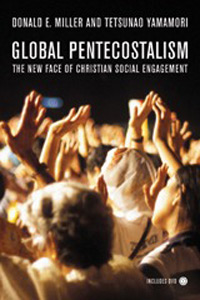Donald E. Miller and Tetsunao Yamamori. University of California Press, 2120 Berkeley Way, Berkeley, California, USA 94704-1012, 2007, 261 pages with accompanying DVD, 24.95 USD(paperback).
Are you ready for a “mental image test” using word association? Here is the word: “Pentecostals.” If your first image was that of a lively worship encounter including throngs (or a solo seeker) with hands upraised in ecstatic, other-worldly abandonment, you have joined most media depictions (both secular and religious). This scholarly but easy-to-read global study of Pentecostal churches and their social engagement may reverse—or at least balance out—that predisposed opinion and mental image.
|
|
When one first glances at the cover photo (a picture of Pentecostals with hands upraised) of Donald Miller’s and Tetsunao Yamamori’s important book, one may think, “Okay, another book on global Pentecostalism. What else is new?” “Global” and “Pentecostalism” have become basically synonymous and there is no shortage of fine treatments of this worldwide spiritual phenomenon.
What is new and groundbreaking about Miller and Yamamori’s new study is the balance provided by their subtitle: The New Face of Christian Social Engagement. It captures with accuracy the growing influence of transformational Pentecostalism on the international social and political scene. The journey that follows indicates, much to the surprise of many, that Pentecostals are just as easily depicted with the mental images of hands outstretched, extended outward in positive social activism and change.
It was a journey full of surprises for Miller (professor of religion and executive director of the Center for Religion and Civic Culture at the University of Southern California) and Yamamori (president emeritus of Food for the Hungry International and senior fellow at Miller’s USC center), who entered the research with the stated intention: “… a phenomenological approach to the study of religious movements.”
The idea for their research was born during their participation in a Southern World consultation when they asked one another, “Why not study growing churches in the Developing World that are involved in significant social ministry?” To their own surprise, after sending inquiry letters (which asked for nominations of churches with stated criteria) to over four hundred mission experts, denominational leaders and other informed consultants, “nearly eighty-five percent of the churches that were nominated were Pentecostal or charismatic.”
After several hundred interviews from leaders in twenty countries in Asia, Africa, Latin America, and Eastern Europe, Miller and Yamamori present a significant gift for the classroom, the researcher and those wishing to understand and connect with the social dynamism of the Pentecostal/charismatic movement. Their extensive notes, index, and instructional DVD are additional benefits.
These social researchers, with affinity to the Great Commission community, have gone beyond the usual “Pentecostalism is growing,” to document the greater contribution for our common global future in worldwide Christianity: How will the dramatic and pervasive international growth of “Progressive Pentecostals” (a term introduced by the authors) draw a new face of Christian social engagement and positive transformation?
(This review originally appeared in the April 2008 issue of Evangelical Missions Quarterly.)


